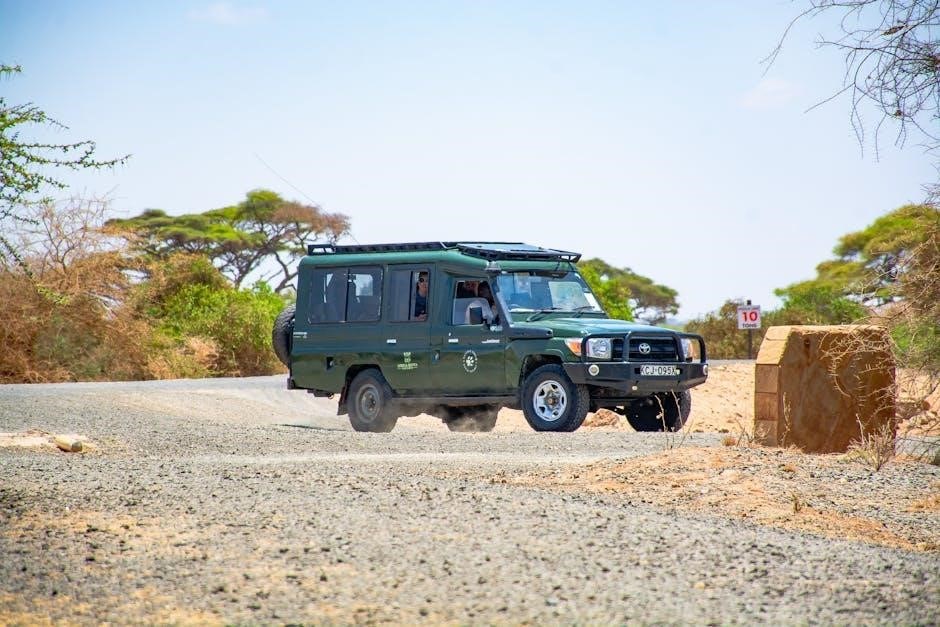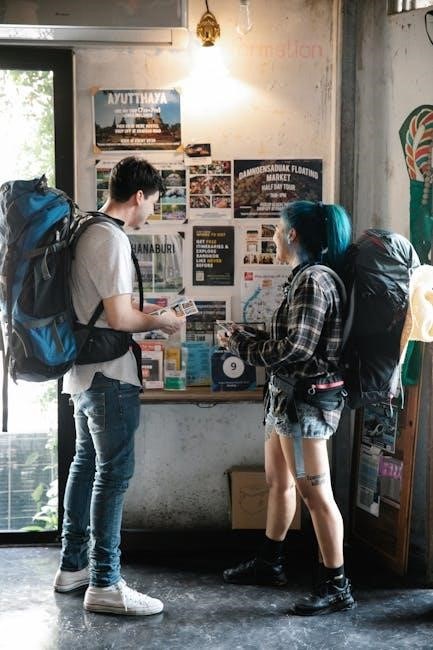Crafting a well-structured tour guide resume is essential to showcase your storytelling‚ communication‚ and problem-solving skills‚ highlighting regional expertise and leadership abilities to attract potential employers effectively.
1.1 Understanding the Importance of a Well-Structured Resume
A well-structured tour guide resume is crucial for making a strong first impression. It highlights your storytelling‚ communication‚ and problem-solving skills‚ essential for engaging tourists. A clear layout ensures your experience and certifications stand out‚ making it easier for employers to recognize your qualifications. A polished resume increases your chances of securing interviews and landing your desired role in the competitive tourism industry.
1.2 Key Elements to Include in a Tour Guide Resume
Essential elements include contact information‚ a professional summary‚ work experience‚ skills‚ education‚ and certifications. Highlight storytelling‚ communication‚ and problem-solving abilities. Emphasize knowledge of landmarks‚ museums‚ and local geography. Include experience leading diverse groups and outdoor activities. Mention any additional training‚ such as first aid or language skills‚ to demonstrate versatility and expertise‚ ensuring your resume stands out in the competitive tourism industry.

Contact Information
Include your full name‚ phone number‚ email address‚ and location. Ensure contact information is clear‚ professional‚ and easy for employers to reach you quickly.
2.1 Essential Details to Include
Your full name‚ phone number‚ email address‚ and location are crucial. Optionally‚ include a professional LinkedIn profile or portfolio. Ensure all details are accurate and professional‚ making it easy for employers to contact you and assess your qualifications quickly and efficiently.
2.2 Tips for Formatting Contact Information
Use a clean‚ professional font and ensure consistency in formatting. List your name prominently at the top‚ followed by contact details in a clear‚ easy-to-read layout. Consider using bullet points for better readability. Include a professional LinkedIn profile or portfolio if applicable. Ensure all information is accurate and properly aligned to create a polished first impression for hiring managers.

Professional Summary
A passionate and experienced tour guide with expertise in storytelling‚ communication‚ and regional knowledge‚ dedicated to delivering memorable experiences for diverse groups of travelers and tourists.
3.1 Crafting a Compelling Summary Statement
A well-crafted summary statement for a tour guide resume should highlight your passion for delivering memorable experiences‚ showcasing your storytelling‚ communication‚ and leadership skills. Emphasize your ability to engage diverse groups‚ share regional knowledge‚ and handle unexpected situations. Keep it concise‚ focusing on key qualifications and achievements that demonstrate your expertise and enthusiasm for guiding tours effectively.
3.2 Highlighting Key Qualifications and Experience
Highlight your most relevant qualifications and experience‚ such as leading diverse groups‚ knowledge of local geography‚ and storytelling abilities. Emphasize outdoor activities‚ problem-solving skills‚ and regional expertise. Include specific achievements‚ like successfully guiding large groups or receiving positive feedback. Quantify accomplishments‚ such as years of experience or tours led‚ to demonstrate your expertise and make your resume stand out to potential employers.

Work Experience
List your previous roles‚ emphasizing tours led‚ groups managed‚ and customer satisfaction. Highlight storytelling‚ communication‚ and problem-solving skills. Include job titles‚ durations‚ and key responsibilities to showcase expertise and adaptability in guiding diverse groups and ensuring memorable experiences for tourists.
4.1 Strategies for Listing Previous Roles
When listing previous roles‚ use bullet points to detail job responsibilities and achievements. Start each bullet with action verbs like “led‚” “organized‚” or “developed.” Quantify achievements‚ such as “guided 50+ tours monthly” or “improved customer satisfaction by 20%.” Highlight transferable skills like communication‚ problem-solving‚ and group management. Tailor each job description to align with the employer’s needs‚ emphasizing relevant experiences and accomplishments that demonstrate your expertise as a tour guide.
4.2 Emphasizing Transferable Skills
Highlight your ability to engage diverse audiences‚ think critically‚ and manage logistics. Showcase storytelling‚ improvisation‚ and communication skills‚ as these are vital for tour guides. Emphasize problem-solving‚ adaptability‚ and leadership abilities. Quantify achievements‚ such as successfully leading groups or improving customer satisfaction. Tailor your skills to align with the job description‚ demonstrating how your experiences make you a versatile and effective tour guide capable of handling various scenarios and challenges.
4.3 Quantifying Achievements
Use specific numbers to demonstrate your impact‚ such as “led 50+ groups annually” or “improved customer satisfaction by 20%.” Highlight achievements like “received 95% positive feedback” or “developed 10 new tour itineraries.” Quantifiable results show your effectiveness and dedication‚ making your resume more compelling to potential employers seeking results-driven tour guides with a proven track record of success in engaging and managing diverse groups effectively.
Skills
5.1 Types of Skills Relevant to Tour Guides
Include communication‚ storytelling‚ and problem-solving abilities. Highlight leadership‚ cultural knowledge‚ and language proficiency. Technical skills like first aid certification and navigation are essential. Soft skills such as adaptability and customer service enhance tour experiences. Emphasize knowledge of local geography‚ history‚ and attractions to demonstrate expertise. These skills showcase your ability to engage and inform tourists effectively‚ making you a valuable candidate for tour guide roles.
5.2 How to Showcase Skills Effectively
Highlight communication and storytelling abilities by incorporating specific examples. Emphasize leadership and problem-solving skills with action verbs. Use bullet points to list technical skills like first aid certification and language proficiency. Quantify achievements‚ such as leading groups of varying sizes. Tailor your skills section to match job postings‚ ensuring relevance and impact. This approach makes your resume stand out‚ demonstrating your effectiveness as a tour guide.
5.3 Including Keywords from Job Postings
Incorporate industry-specific keywords from job postings to align with applicant tracking systems (ATS) and hiring managers’ expectations. Use terms like “storytelling‚” “group leadership‚” or “geographical knowledge.” Naturally integrate these keywords into your skills‚ professional summary‚ and work experience sections. Avoid overstuffing; instead‚ focus on seamless integration to ensure your resume passes ATS filters and captures attention effectively.
Education and Certifications
6.1 Highlighting Relevant Educational Background
Include degrees or certifications in hospitality‚ tourism‚ or related fields to showcase your foundational knowledge. Highlight coursework in history‚ cultural studies‚ or languages to demonstrate expertise. Mention any specialized training in tour management or customer service to strengthen your qualifications. Ensure your educational background aligns with the tour guide role‚ emphasizing skills that enhance your ability to engage and inform visitors effectively.
6.2 Importance of Certifications
Certifications significantly enhance your credibility as a tour guide. They demonstrate your expertise and commitment to professional standards. Obtain certifications from recognized tourism boards or industry associations to validate your knowledge of local history‚ culture‚ and safety protocols. Highlighting these credentials ensures employers recognize your qualifications and trust your ability to lead engaging and informative tours.
Additionally‚ certifications in first aid‚ safety training‚ or language proficiency can further strengthen your resume‚ showing your readiness to handle diverse groups and situations effectively.
6.3 Including Additional Training
Including additional training highlights your commitment to professional growth. Mention workshops‚ courses‚ or seminars related to storytelling‚ cultural heritage‚ or customer service. Specify any language proficiency or technical skills acquired‚ such as GPS navigation or digital tools for tour management. This showcases your ability to adapt and deliver engaging‚ informative tours. Always list the training provider and completion date for credibility.
Resume Formatting and Layout
A clean‚ professional layout is crucial for a tour guide resume. Use a readable font‚ consistent spacing‚ and clear headings to ensure your resume is visually appealing and easy to navigate.
7.1 Choosing the Right Format
Selecting the right format for your tour guide resume is vital. Opt for a layout that emphasizes readability‚ using clear headings and bullet points. Ensure your contact information is prominent. Highlight professional experience and skills relevant to the role. Use a clean font style and consistent spacing to make your resume visually appealing to hiring managers. Keep it simple and professional to ensure your qualifications stand out effectively in a competitive job market.
7.2 Design Tips for a Professional Look
To ensure your tour guide resume has a professional appearance‚ use a clean and modern design. Select a readable font like Arial or Calibri‚ and maintain consistent spacing. Avoid overly elaborate designs or bright colors. Use bullet points for clarity and ensure proper alignment. Highlight key sections with bold headers but keep the overall look simple. A polished‚ error-free design enhances readability and professionalism‚ making your resume stand out to hiring managers.

Using Resume Templates
Resume templates save time and help create a professional look. Customize them to fit your tour guide role‚ ensuring your skills and experience stand out clearly.
8.1 Benefits of Using Templates
Using resume templates offers numerous benefits for tour guide resumes. They save time‚ provide a professional structure‚ and ensure a clean‚ organized layout. Templates help highlight key skills‚ experience‚ and certifications‚ making it easier for employers to see your qualifications. Customizable options allow you to tailor the design and content to fit your specific role‚ ensuring your resume stands out in a competitive job market.
8.2 Customizing Templates for Tour Guide Roles
Customizing templates for tour guide resumes involves tailoring the content to highlight storytelling skills‚ regional expertise‚ and leadership abilities. Emphasize your knowledge of landmarks‚ museums‚ and local culture. Use bullet points to showcase specific experiences‚ such as guiding diverse groups or handling unexpected situations. Ensure the design aligns with the job description‚ making your resume visually appealing and relevant to the tour guide role you’re applying for.

Tailoring Your Resume
Adapt your resume to match job descriptions‚ emphasizing relevant skills like storytelling‚ leadership‚ and regional knowledge. Customize your experience to align with the employer’s needs and preferences‚ ensuring your resume stands out for tour guide roles by showcasing what makes you a unique candidate for the position. This approach increases your chances of securing an interview.
9.1 Adapting Your Resume for Different Jobs
Customize your resume for each tour guide role by highlighting relevant skills and experiences. Tailor your professional summary to align with the job description‚ emphasizing specific qualifications like storytelling‚ leadership‚ or regional expertise. Modify your work experience section to focus on duties and achievements that match the employer’s requirements. Incorporate keywords from the job posting to increase your resume’s relevance and appeal to hiring managers‚ making it more likely to pass through applicant tracking systems and catch the eye of potential employers seeking a candidate with your unique blend of skills and knowledge.
9.2 How to Research the Employer
Research the employer by visiting their website and understanding their tour offerings‚ target audience‚ and company values. Review job descriptions to identify keywords and emphasize relevant skills like regional expertise or storytelling. Tailor your resume to align with their specific needs‚ ensuring your experience and qualifications match their focus‚ whether it’s cultural tours‚ adventure trips‚ or historical landmarks. This ensures your resume is both relevant and engaging to the hiring team.

Common Mistakes to Avoid
Avoid including irrelevant sections‚ poor formatting‚ and lack of quantifiable achievements. Ensure proofreading for errors and conciseness‚ avoiding generic phrases. Tailor content to the job’s specific requirements precisely.
10.1 Avoiding Red Flags
Avoid including irrelevant sections‚ unprofessional language‚ or exaggerated claims. Ensure your resume is free of grammatical errors and formatting inconsistencies. Omit unnecessary information like hobbies or unrelated job roles. Focus on clarity and conciseness to maintain professionalism and make your resume appealing to potential employers.
10.2 Ensuring Accuracy and Relevance
Ensure all information is truthful and tailored to the tour guide role. Include specific examples of your experience‚ such as leading tours or handling diverse groups. Avoid generic statements and focus on achievements that align with the job requirements. Double-check dates‚ certifications‚ and contact details for accuracy. Use job-specific keywords to make your resume relevant and increase the chances of passing applicant tracking systems (ATS).
Final Tips for Success
Proofread your resume meticulously to avoid errors. Tailor it for each job application‚ emphasizing relevant skills and experiences; Use keywords from job postings and highlight storytelling abilities to stand out‚ ensuring your regional expertise shines through clearly.
11.1 Proofreading Your Resume
Proofreading is crucial to ensure a polished and professional resume. Check for spelling‚ grammar‚ and formatting errors. Read aloud to catch awkward phrasing. Ensure consistency in dates and job titles. Use tools like Grammarly or have a friend review it. Accuracy reflects attention to detail‚ a key trait for tour guides. A well-proofread resume avoids red flags and enhances credibility‚ making a strong first impression on hiring managers.
11.2 Seeking Feedback
Seeking feedback from mentors‚ colleagues‚ or career services can provide valuable insights. Others may identify strengths or areas for improvement you overlooked. Ask for opinions on clarity‚ relevance‚ and impact. Use their suggestions to refine your resume‚ ensuring it resonates with employers. Feedback is a powerful tool to enhance your resume’s effectiveness and increase your chances of landing interviews in the competitive tour guide industry.